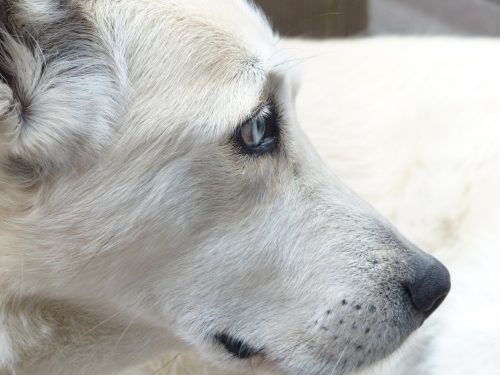“Achoo!”
Ah, the all-too familiar sound of a co-worker or family member coming down with a cold. While humans pass the cold virus to one another, is it possible that your dog could come down with the very same illness?
Common Symptoms of a Dog Cold
To answer that first question in one word: no. Dogs cannot catch the cold virus from a human. They can, however, pass it among each other.
Though the virus passed from canine to canine is different from that of humans, it still produces similar cold symptoms in our four-legged friends. As in humans, the cold dogs carry is also an upper respiratory infection that can manifest in the following ways:
- Nasal congestion, nasal discharge, or a runny nose
- Difficulty breathing through the nose
- Coughing and/or sneezing
- Fever
- Fatigue
- Runny eyes
- Loss of appetite
As with humans, dog colds are not usually serious (just uncomfortable) and they often pass naturally after a week.
Different Types of Dog Colds
Like the common cold in humans, dog colds will likely dissipate after a week. But since dogs are unable to alert us as to how they’re feeling, you will have to monitor your pup closely to ensure it doesn’t evolve into something more serious.
Aside from the common dog cold, dogs can develop “kennel cough” – an upper respiratory infection. Named for a dry cough transmitted through kennels or boarding facilities. This cough is most recognizable by its honking sound. If you suspect your dog has kennel cough, your veterinarian will need to administer treatment.
Other contagious illnesses which manifest more seriously than a passing cold include:
- The canine influenza virus
- Parainfluenza virus
- Adenovirus
- Tuberculosis
If your dog is coughing as well as vomiting, has a high fever, and emits a thick discharge from his eyes or nose, he may have caught a viral illness known as canine distemper. Canine distemper is potentially life-threatening. See your vet for diagnosis and treatment.
A Different Type of Cold
Sometimes parasites can enter a dog’s lungs, heart, or trachea, mimicking the cold virus by producing a cough or breathing problems. Fungal infections are also problematic and can lead to life-threatening conditions. Be sure to watch for an ongoing cough, as this infection can lead to scarring of the lung tissue—even pneumonia.
Dogs are also prone to developing allergies to triggers in their surroundings and/or food. Just like in humans, dogs who exhibit coughing or sneezing fits may be subject to allergies.
How to Treat A Dog Cold
Currently, there is no cure for the common cold—for humans, or for dogs. Provide comfortable care with the following steps to ward off the virus even faster:
Step One: Ensure your dog is kept warm and dry. If it’s cold, limit his or her time outside, as chilly air causes bronchial tubes to tighten, making breathing more difficult. Another suggestion for easy breathing is to keep a humidifier near your dog’s sleeping area to moisten his bronchial tubes.
Step Two: Liquids are important to the recovery process as they thin out congestion. Make sure your dog is well hydrated, offering plenty of water, even low-sodium chicken broth, if necessary.
Step Three: Speaking of chicken broth, boiled chicken and brown rice are great ways to comfort and feed your pup. Proper nutrition ensures that your dog will recover from this pestering bug.
Important Side Note: As the cold virus can spread from dog to dog, be sure to keep your sick pup away from any other animals in the house.
When to See the Vet
If your dog still isn’t recovering after about a week of following the aforementioned steps, it may be time to visit the vet. Your veterinarian may prescribe children’s cold medicine to ease the symptoms, though they won’t treat the cold completely.
Some dog colds require stronger medications to knock out the illness completely, while very young or very old dogs have weaker immune systems and may require more care from your vet.
It’s never fun to watch your loved ones feeling weary or unwell. But with the proper care and a lot of love, your dog will be on his way to his happy, healthy self in no time.






